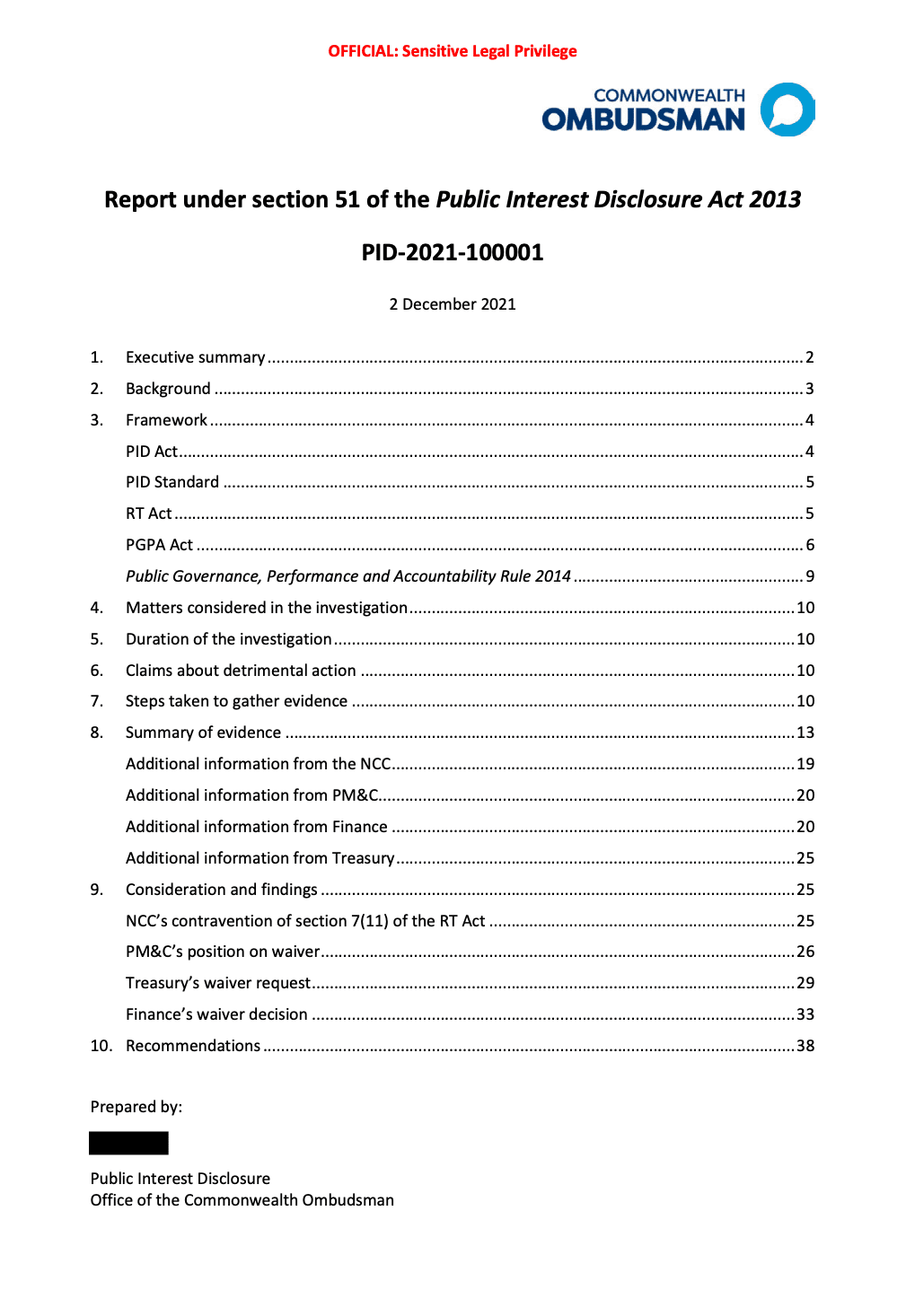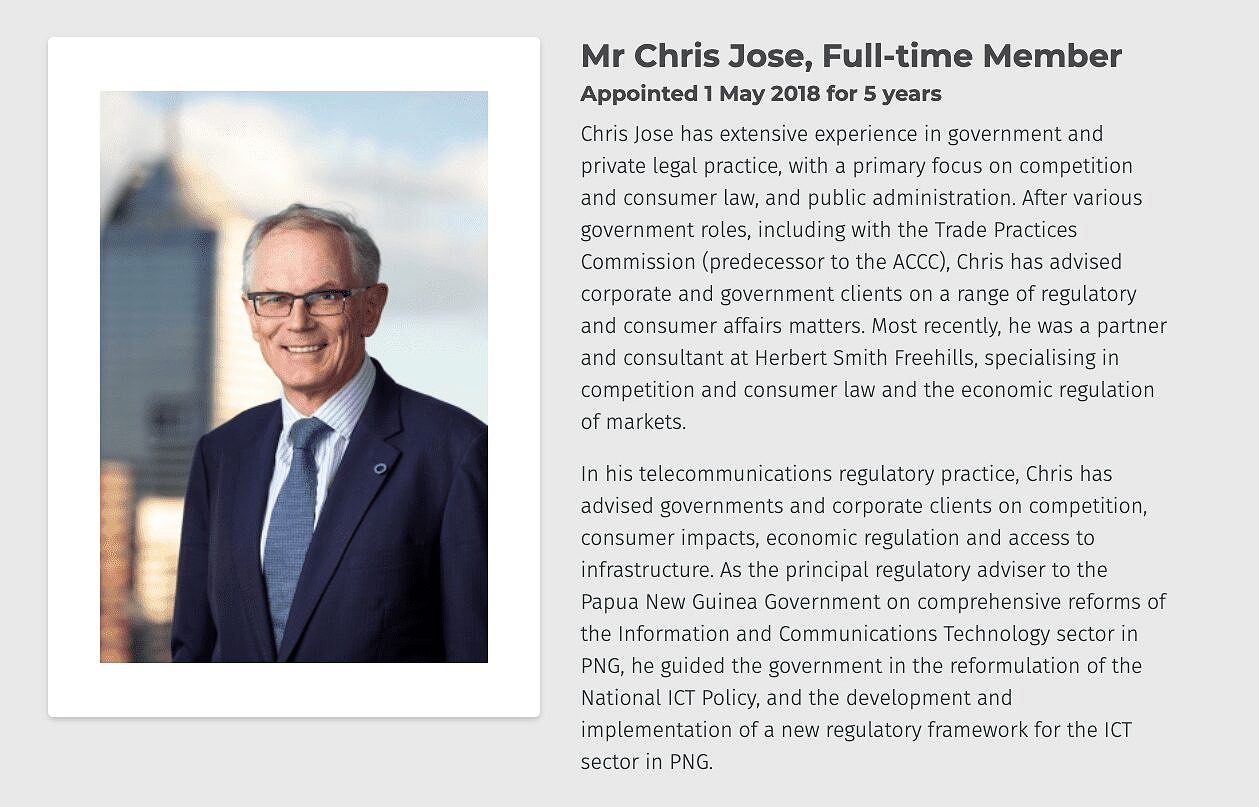A boss of the nation’s embattled media regulator, ACMA, was illegally paid two government salaries, receiving $41,000 in overpayments. Yet when the “error” was exposed by a whistle-blower, top level government officials failed to recover the money. Instead they spent months – and vastly more resources – going out of their way to help him keep it. Anthony Klan reports
Appreciate our quality journalism? Please donate here
EXCLUSIVE
The Federal Government has become embroiled in another salary cap scandal, this time involving a key official of the nation’s media watchdog, secret Commonwealth Ombudsman documents reveal.
Australian Communications and Media Authority (ACMA) executive Chris Jose – a Coalition Government appointee – was illegally paid for two public service jobs simultaneously, receiving $41,073 in overpayments over two years.
The details of the scandal are set out in a secret 40-page report which details a year-long investigation into the matter conducted by the Office of the Commonwealth Ombudsman.
The report was completed on December 2 and is marked “OFFICIAL: Sensitive Legal Privilege”.
A copy has been obtained by The Klaxon.
It’s highly damning.
Laws were broken, policies were disregarded and expert departmental advice ignored.
The Ombudsman’s report is heavily critical of the office of Prime Minister and Cabinet (PM&C); the Department of Treasury; the Department of Finance; and career lawyer Julie-Anne Schafer, who was President of the National Competition Council (NCC) until her term expired last month.
For two years, from May 2018 to April 2020 – at the same time he was being paid by ACMA in a full-time role – Jose was employed by the National Competition Council in a part-time role, collecting a $20,000 annual salary.
The National Competition Council exists to make determinations on usage of monopoly assets, such as ports and gas pipelines, and is staffed by employees of competition regulator the Australian Competition and Consumer Commission (ACCC).
Under Remuneration Tribunal laws, government employees cannot receive a second government salary if they already have a full-time public service job.
The secret Ombudsman report reveals that instead of simply having Jose repay the $41,073 debt (in the way government debts, such as those to the tax office or Centrelink are usually recovered), top-levels of government went out of their way over many months – and at considerable cost – to prevent Jose having to repay the money.

The secret Commonwealth Ombudsman report. Source: Supplied
The report reveals the Department of Prime Minister and Cabinet; the Department of Treasury and the Department of Finance all worked together in a complex arrangement in order to waive the debt.
That’s allowed Jose, who previously spent 15 years as partner of major law firm Freehills, to legally keep the illegally paid money.
“That’s allowed Jose to legally keep the illegally paid money”
The Klaxon put a series of questions to Jose on Friday.
This afternoon ACMA provided a response on Jose’s behalf.
“Mr Jose has acted properly in fulfilling his roles with the ACMA and the NCC,” the statement says.
“There is nothing in the Commonwealth Ombudsman report that suggests otherwise and any imputation of illegality by Mr Jose is strongly rejected.”
The investigation into the matter was triggered by the actions of a whistleblower.
The Commonwealth Ombudsman launched its secret investigation on January 25 last year.
Its investigation shows that the Department of Prime Minister and Cabinet was made aware of the scandal over 18 months ago, on May 6, 2020.
Prime Minister Scott Morrison’s office did not respond to a series of written questions from The Klaxon last week.
The Ombudsman found:
- The National Competition Council (NCC) broke the Remuneration Tribunal law by paying the $41,073, made in 53 improper payments
- NCC President Julie-Anne Schafer “failed to exercise due care and diligence” as required by law in making the payments
- Instead of recovering the debt, Schafer passed the matter to the Department of Prime Minister and Cabinet (PM&C), which is legally responsible for Remuneration Tribunal matters
- Instead of dealing with the matter, PM&C created a “legal instrument” officially passing the matter to Treasury
- Instead of recovering the $41,073, Treasury applied to the Department of Finance to “waive the debt”
- Finance agreed to waive the $41,073 debt, allowing Jose to keep all the money
- Treasury’s decision “to pursue a full waiver of the debt” was improper and “not consistent with best practice”
- Finance improperly failed to keep any records about its decision to approve the waiving of the debt
- PM&C told Treasury it had “no objections” to a waiver, despite not having properly considered other options
- The subsequent investigation was so complex the Ombudsman sought “four extensions”, ultimately taking 311 days to complete the report
Experts say the Jose scandal further highlights the dire need for a federal anti-corruption regulator: none of this information – the investigation or its findings – would have been made public if it weren’t for a leak to The Klaxon.
The case bears a striking resemblance to the salary cap scandal at the top of corporate regulator, the Australian Securities and Investments Commission (ASIC).
That scandal cost the jobs of ASIC chair James Shipton (who improperly charged taxpayers $118,557 for personal “tax advice” from KPMG) and Deputy Chair Daniel Crennan QC (who received $69,000 in illegal payments towards the rent of his luxury Sydney home).
The ASIC case only became public because Auditor-General Grant Hehir took extremely rare legal action to force it into the open.
When it became known the matter would become public, Shipton and Crennan announced they would repay the money.
The Jose scandal has remained under covers — until now.
Jose has not repaid any of the illegal payments, which total $41,073.06.
Yes way, Jose
In December 2017, the Coalition Government appointed Jose as a part-time councillor of the NCC for a period of three-years.
Five months later, on May 1 2018, the Coalition appointed Jose to a second role – a full-time member of media regulator ACMA, for a period of five-years.
Jose received both salaries from May 1, 2018, when he started at ACMA, until April 30 2020, the month after the NCC was alerted to the illegality by a whistleblower and stopped making the payments.
“When Mr Jose became aware in April 2020 that payment by the NCC contravened Remuneration Tribunal rules, he immediately asked that his NCC salary be stopped and he agreed to continue in his role through to the end of his term in December 2020,” ACMA’s statement on Jose states.
“The waiver decision was made by the Department of Finance and did not involve Mr Jose.”
Payments to senior government officials are set by the Remuneration Tribunal and governed by the Remuneration Tribunal Act.
The Department of Prime Minister and Cabinet (PM&C) is responsible for both.
The Ombudsman report states that PM&C, ACMA, the NCC (and by extension the the ACCC, which provides all the NCC’s staff) were all apparently unaware of the illegality of paying Jose two salaries.
The NCC states that the $41,073 payments were an “inadvertent mistake”.
Finance says they were the result of a “failure of process”.
The Ombudsman says it accepts this: but it’s what happened next that’s the issue.
And what happened next is remarkable.
“And what happened next is remarkable”
The whistleblower alerted the NCC to the illegality of the Jose payments in March 2020.
The $41,073 paid to Jose for his second government job was clearly illegal.
As NCC President it was up to Schafer to deal with the matter.
Yet rather than simply having Jose repay the money, or arrange for the money to be recovered from his future paycheques, Schafer passed the matter on to the Prime Minister and Cabinet (PM&C).
Schafer claimed – though no evidence is provided as to why – that she was unable to handle the case due to the potential for a perceived conflict of interest.

Ben Morton MP, Federal Member for the Public Service. Source: Supplied
The PM&C held meetings and co-ordinated with both Treasury and Finance.
Among the many senior public servants involved were PM&C Assistant Secretary Peter Rush; Department of Finance Assistant Secretary Gareth Sebar; and head of Market Conduct at Treasury, Christine Barron. (More to come).
Despite the PM&C being the department legally responsible for Remuneration Tribunal matters, the PM&C then passed the matter on to the Department of Treasury.
Treasury told Ombudsman investigators this was because PM&C “had concluded that the matter would be managed more effectively by a larger agency”.
That is, the simple matter of a salary overpayment, which was initially supposed to be handled by the NCC itself, was apparently too big for the Department of Prime Minister and Cabinet – which is comprised of the most powerful members of Australia’s government.
Within weeks, PM&C Assistant Minister, Liberal MP Ben Morton, undertook a legal manoeuvre handing the case to Treasury.
“On May 27 2020 the Assistant Minister to the Prime Minister and Cabinet, the Hon Ben Morton MP, signed an instrument prescribing the Department of the Treasury as the relevant Commonwealth authority,” the Ombudsman report shows.
That same day, MP Morton, who is also the Federal Minister for the Public Service, wrote to the head of the Department of Treasury, Steven Kennedy, to officially inform him of the arrangement.
Within days, Treasury applied to the Department of Finance – the entity responsible for authorising debt waivers – to waive the debt.
The Department of Finance agreed.
The arrangement was highly unusual.
“Treasury did not provide any information about the viability of other debt management options and Finance did not ask Treasury to provide that information before making a decision on the waiver request,” the Ombudsman report says.
“Treasury did not provide any information about the viability of other debt management options and Finance did not ask” — Commonwealth Ombudsman
Timeline:
- December 18, 2017: Jose is appointed part-time NCC Councillor
- May 1, 2018: Jose is appointed full-time member of ACMA
- March, 2020: A whistleblower tells NCC the Jose payments are illegal
- April 30 2020: NCC stops making payments to Jose
- May 6, 2020: NCC President Julie-Anne Schafer passes the matter to PM&C
- May 12, 2020: PM&C, Finance and Treasury hold a teleconference to discuss the Jose matter
- May 27 2020: Assistant Minister to the PM&C, Ben Morton MP, signs legal instrument handing matter to Finance
- August 13, 2020: Finance grants a “waiver” of the Jose debt
- January 25, 2021: Ombudsman investigator begins its investigation
- December 2, 2021: Ombudsman officially completes its secret report
“Last Resort”
The Ombudsman’s report states that, legally, there are three options available to the Government when it has made an overpayment – such as to an employee or Centrelink recipient.
It can recover the debt (the most common option); it can “offset” the debt (such as recovering the amount owing from a person’s future paycheques or Centrelink payments); or the government can “waive” the debt.
Waiving a debt is the least common option.
To the recipient, waiving a debt is even more favourable than “writing-off” the debt: if a debt is “written-off” the government it can still recoup the money at a later date if circumstances change.
Waiving a debt eradicates it permanently.

Jose’s ACMA bio. Source: ACMA
As such, the law states that waiving a debt is “generally a remedy of last resort” and “it will generally not be used when there is another viable remedy available”.
The Ombudsman’s report sets out the law:
“The decision-maker on a waiver request must consider the ‘existence of other debt management options (which would allow the Commonwealth to maintain the right to recover the debt at some later date) and whether they would be more appropriate in the circumstances’.”
This didn’t happen.
And instead of attempting to recover the debt from Jose, or to “offset” the debt from his future salary, Treasury then “proceeded directly to a waiver”.
And Finance, on receiving the waiver request, approved it without considering any other options.
“There is no evidence before the (Ombudsman) investigators that attempts were made to offset the debt against future…payments,” the Ombudsman report says.
“It is not apparent that any of the agencies (including the NCC, Treasury and Finance) considered and determined that offsetting the debt would not be a viable or appropriate option in the circumstances.
“The circumstances surrounding the decision to proceed directly to a waiver do not constitute best practice,” the report states.
“The circumstances surrounding the decision to proceed directly to a waiver do not constitute best practice” — Commonwealth Ombudsman
The Ombudsman report compares the case of Jose’s debt to that of Centrelink recipients who have been overpaid.
“Noting…that as a matter of practice debts arising from agency error, such as Centrelink overpayments, are routinely recovered, there is a heightened expectation that Treasury’s decision to not pursue recovery would be well-documented and clearly defensible.”
Yet, the report found, Treasury’s decision was neither.

Gareth Sebar. Source: Supplied
“While the decision to pursue a waiver was legally available, Treasury’s failure to properly investigate and document its consideration of other debt management options does not model best practice and does not meet expectations around accountability and transparency in administrative decision-making,” it states.
Finance’s decision to approve the waiver was similarly deficient.
“Finance’s decision in this case not to request additional information from Treasury….was not good administrative practice,” the report states.
The person at the Department of Finance who approved the waiver was Assistant Secretary Gareth Sebar.
“The evidence before the investigator does not support a conclusion that Mr Sebar considered any other other debt management options (such as offsetting) and whether they would be more appropriate in the circumstances,” the Ombudsman report states.
Some of the key players:
– Julie-Anne Schafer, lawyer and former NCC President
– Chris Jose, lawyer, current full-time ACMA member, former NCC Councillor
– Peter Rush, Assistant Secretary, PM&C
– Gareth Sebar, Assistant Secretary, Finance. Head of Significant Matters Taskforce
– Christine Barron, Division Head, Market Conduct Division, Treasury
– Ben Morton MP, Assistant Minister to the Prime Minister and Cabinet, Federal Minister for the Public Service
– Steven Kennedy, Secretary to the Treasury
“No objections”
The report shows the Department of Prime Minister and Cabinet told Treasury it had “no objections” to a waiver of the Jose debt – despite PM&C not having formally assessed other options.
The Ombudsman report says PM&C confirmed this.
Yet, remarkably, the most powerful office in the land refused to explain further.
“The basis for PM&C’s position was unclear on the evidence before the investigator,” the Ombudsman report states.
“Although the investigator requested that PM&C explain its assessment of any relevant policy considerations, PM&C’s response did not address this”.
“Although the investigator requested that PM&C explain its assessment of any relevant policy considerations, PM&C’s response did not address this” — Commonwealth Ombudsman
The report says neither the NCC, PM&C, Treasury or Finance made any attempt to recover the money from Jose.
NCC President Schafer told investigators she had discussed the overpayments matter with Jose via a telephone call on April 24, 2020.
Jose had reportedly said he was “unaware of any issue that would prevent him from being remunerated for both roles” and that “there was no question that he had provided services to the NCC” and so “considered he was in an unfair position”.
(Jose’s bio at NCC stated he had 30 years legal experience, including 15 years at Freehills “in competition and market regulation”.)
In the report, Schafer says the NCC did not seek recovery of the debt – because she had passed the matter on to the PM&C to handle.
In making the illegal payments to Jose, the Ombudsman report found Schafer had “failed to exercise due care and diligence” as required by law, and so had breached section 7(11) of the Remuneration Tribunal Act.
The Ombudsman investigators accepted that her breaking the law was “unintentional”.
“However, in assessing whether an official has exercised due care and diligence, the question is not whether the contravention was intentional, but what steps a reasonable person in the official’s circumstances would have taken.
“In this case, the investigator’s view is that a reasonable person…would have taken steps to familiarise themselves with the provisions of the Act.”
“A reasonable person…would have taken steps to familiarise themselves with the provisions of the Act” — Commonwealth Ombudsman
Further, the payments to Jose only “ceased after the issue was brought to the NCC’s attention” by the whistleblower.
Schafer’s second three-year term at the NCC ended last month.
She is currently a director of Queensland Government energy provider CS Energy and a director of Queensland water distribution company Urban Utilities.
Schafer did not respond to The Klaxon’s requests for comment.
National Competition Council spokeswoman Malika Bouhafs said the NCC had received the Ombudsman’s final report on December 16.
“The Ombudsman’s final report found the NCC unintentionally contravened section 7(11) of the Remuneration Tribunal Act 1973 (RT Act),” Bouhafs said.
“As a result of the incident, the NCC reviewed and amended its protocols in 2020 to ensure such a situation does not occur again. The Ombudsman’s report did not make any recommendations for further action by the NCC.”
In a statement to The Klaxon the Department of Treasury said it had “initiated changes to improve the consideration, management and documentation of future debt waiver proposals”.
WE HAVE A FAVOUR TO ASK: We receive zero government funding and are entirely funded by our readers. Investigations such as this take an enormous amount of time and effort. Please DONATE HERE to help keep us afloat.
Thank you very much for your support!
Anthony Klan,
Editor The Klaxon
Do you know more? anthonyklan@protonmail.com
Help us get the truth out from as little as $10/month.
Unleash the excitement of playing your favorite casino games from the comfort of your own home or on the go. With real money online casinos in South Africa, the possibilities are endless. Whether you’re into classic slots, progressive jackpots, or live dealer games, you’ll find it all at your fingertips. Join the millions of players enjoying the thrill of real money gambling and see if today is your lucky day!
The need for fearless, independent media has never been greater. Journalism is on its knees – and the media landscape is riddled with vested interests. Please consider subscribing for as little as $10 a month to help us keep holding the powerful to account.






